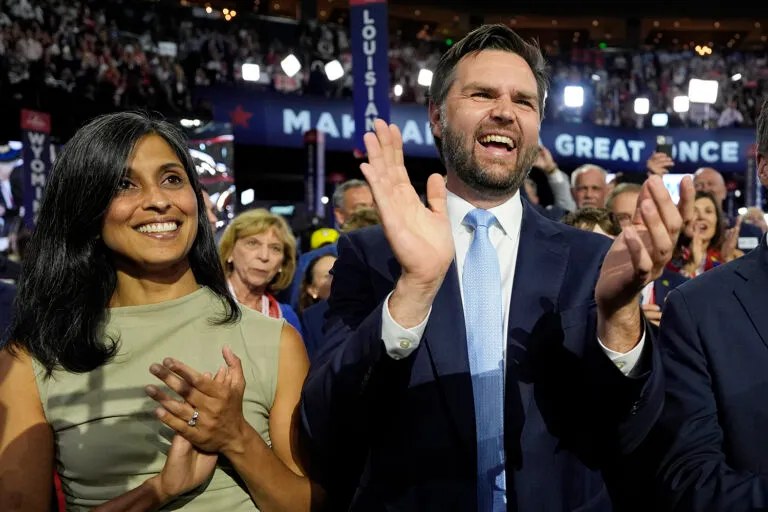As the 2024 presidential election approaches, a notable shift is occurring among American Hindu voters. The introduction of Usha Chilukuri Vance, wife of Senator JD Vance, as Donald Trump’s new running mate has brought a fresh perspective to the political realignment within this community. This shift, while often met with skepticism by political analysts, warrants a thorough examination.
Usha Vance: The Influence of a Life Partner
Usha Chilukuri Vance, a Hindu and daughter of Indian immigrants, has garnered significant attention not just for her identity but for the potential impact she may have on the political orientation of her community. JD Vance, known for his conservative views and focus on the American working class, might seem like an unlikely partner for Usha, whose faith and cultural heritage are central to her identity. In a Fox News interview, Vance revealed that his wife’s spiritual journey profoundly influenced his own conversion to Catholicism, underscoring the role of faith in both his personal life and political views.
The Political Shift Among American Hindus
The shift in political affiliation among American Hindus is not just a matter of perception; it is reflected in concrete data. A survey released on July 10 by four advocacy organizations showed a decline in Democratic identification among Indian American voters, dropping from 54% in 2020 to 46% in 2024. Concurrently, Republican affiliation increased from 16% to 23%. Support for President Joe Biden fell significantly, while support for Donald Trump saw a modest rise. These figures indicate a real shift in preference within the community.
Concerns About Crime and Discrimination
Data also reveal significant concerns among Hindu American voters. Approximately 68% reported worries about crime, harassment, and discrimination, which may be linked to a series of temple vandalism incidents affecting the Hindu community in the past year. The Trump administration’s hardline policies might be seen as more responsive to these concerns compared to the Biden administration, which has criticized controversial measures in India such as the Citizenship Amendment Act and the revocation of Article 370.
The Influence of Trump and Modi
The relationship between Donald Trump and Indian Prime Minister Narendra Modi is a key factor in the observed political shift. The 2019 “Howdy, Modi!” event in Houston marked a significant strengthening of US-India relations under Trump’s presidency. Many Hindu Americans view Trump’s neutral stance on internal Indian issues as more favorable compared to Biden’s criticisms of Modi’s policies.
Dissatisfaction with Progressive Left
The growing dissatisfaction with the “progressive left” and the demonization of Hinduism also play a crucial role. Efforts such as the attempt to include caste in anti-discrimination statutes in California and criticisms of Hindu nationalist donors have contributed to negative perceptions among some Hindu Americans. Anang Mittal, former head of digital communications for House Speaker Mike Johnson, notes that the left’s criticism of Modi and his version of Hindu nationalism might be pushing some Hindus towards a more conservative stance.
Usha Vance’s Prominence in American Politics
Usha Vance now stands as the most prominent Hindu figure in American politics, surpassing Vivek Ramaswamy and Tulsi Gabbard. Her adoption of a vegetarian diet typical of Hindu practices and the visibility of her Hindu wedding contribute to a positive and visible image for the community, potentially increasing support for the Republican Party.
Diverse Opinions and Challenges
However, the idea that all Hindu Americans will fully align with the Republican Party might be overstated. Many Hindus continue to view the Democratic Party as the “default party” for the diaspora. Furthermore, many Hindus prefer to keep their political identity separate from their religious identity, focusing on broader issues like crime prevention, taxes, and inflation.
The Role of Community Organizations
Organizations like the International Society of Krishna Consciousness (ISKCON) maintain a non-political stance, emphasizing that they do not endorse any party or candidate. This reflects a desire among many Hindu Americans to keep their political and religious identities separate.
Conclusion and Future Outlook
As the 2024 election nears, it is clear that the American Hindu community is undergoing a significant transformation. The influence of figures like Usha Vance and changes in political affiliations indicate an evolving political landscape. Nevertheless, the complexity of Hindu American identity suggests that while some may shift their support to the Republican Party, others will continue to seek balanced representation that reflects a broader range of interests and concerns.
FAQ
1. Who is Usha Vance and what is her current role in American politics? Usha Vance is the wife of Senator JD Vance and a prominent figure among American Hindus due to her cultural background and her impact on the political landscape. She recently became Donald Trump’s running mate for the 2024 election.
2. How has the political affiliation of Hindu Americans changed in recent years? According to a survey from July 2024, Hindu American affiliation with the Democratic Party decreased from 54% in 2020 to 46%, while Republican affiliation increased from 16% to 23%.
3. What are the main concerns of Hindu American voters? Hindu American voters are primarily concerned with issues related to crime, harassment, and discrimination, which may be linked to recent incidents of vandalism in temples and criticism of Biden’s policies regarding India.
4. How has the relationship between Trump and Modi influenced Hindu American politics? The positive relationship between Trump and Modi, highlighted by events like “Howdy, Modi!” has contributed to a favorable view of Trump among Hindu Americans, especially in contrast to Biden’s criticism of Modi’s policies.
5. Are there Hindu organizations that maintain a political neutrality? Yes, the International Society of Krishna Consciousness (ISKCON) and similar organizations adopt a non-political stance, indicating a preference to keep religious and political identities separate.
6. What does the future hold for Hindu American political engagement? While there is evidence of a shift towards the Republican Party, many Hindu Americans will continue to seek representation that addresses a wide range of issues beyond partisan affiliations, reflecting a diverse and evolving political landscape.


